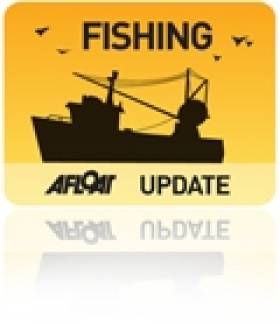Displaying items by tag: Banríon Uladh
New Fisheries Protection Vessel for Northern Ireland
The FPV was built by AS Baltic Workboats in Estonia and the 25 knot plus craft has already entered on operational duties as part of the Joint Deployment Plan with the Irish Naval Service to underpin fishery protection arrangements.
Layout of the vessel superstructure consists of the wheelhouse for a crew of three and provisional space for two observers. At the aft end there is a wet laboratory for scientific and data collecting purposes. On the lower deck the vessel can accommodate seven crew members in three twin cabins and a single cabin for the captain. Other facilities are the mess, galley and WC.
An onboard RIB, powered by twin 60hp outboards is located aft in the stern-well. Also located at the stern is a two ton capacity movable hydraulic gantry and a one ton Guerra marine deck crane. To create more deck-space for scientific research operations, the stern-well can be covered over with boards, a similar design feature is found on the Revenue Commissioners two Finish built custom cutters RCC Suirbheir and RCC Faire.
In addition to fishery protection, the craft is designed for seabed mapping, survey equipment technology to inspect inshore mussel resources for the
aquaculture industry and to detect pollutants. The ability to conduct such functions will enable greater assistance and understanding of the marine environment for DARD's science partners at the Agri-Food and Biosciences Institute (AFBI).
The design of the Banrion Uladh is based on Baltic Workboats 24m Baltic 2400 class which has been operating for clients in Estonia, Latvia and Poland. In addition the same class is also to be used as a basis for boats which are under construction for the Swedish Coast Guard.






























































